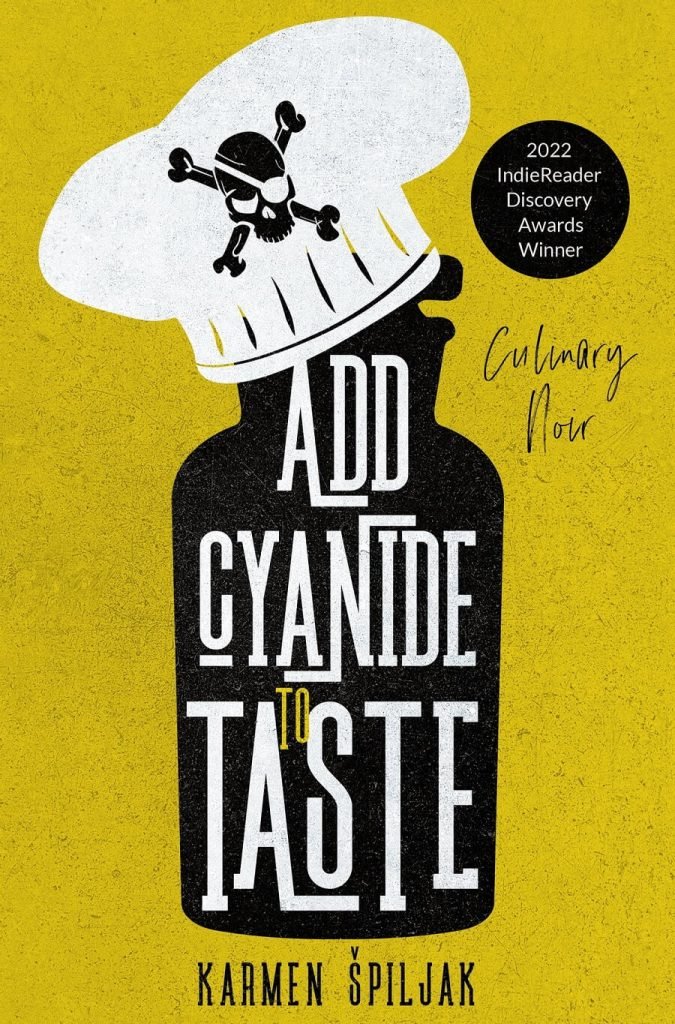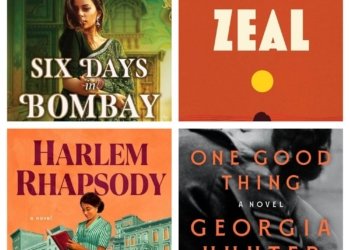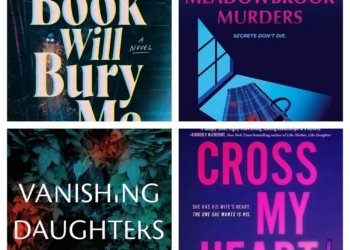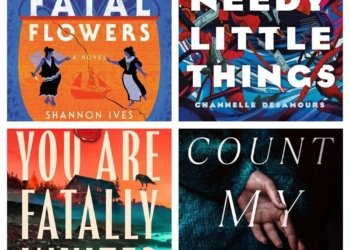No products in the cart.
A Conversation with Karmen Špiljak, a Suspense, Thriller Author
Karmen Špiljak, author of popular Thriller novel "Add Cyanide to Taste", has done BA in Political Science and received her PhD in Anthropology of Gender, and won numerous awards for her writing skills.
117
SHARES1.7k
VIEWSKarmen Špiljak is an award-winning indie author of suspense. Her collection of culinary noir, ‘Add Cyanide to Taste’, won the 2022 IndieReader Discovery for short stories and her thriller, ‘No Such Thing as Goodbye’, received an honourable mention for the Black Spring Crime Fiction Prize 2020. In her former life, she acquired a PhD in Anthropology of Gender, shortly Deejayed on the Slovenian alternative scene and played in two bands.
She has lived in Slovenia, Germany, Brazil and Belgium, where she feels most at home. Currently, she lives in Belgrade, Serbia, with her husband, their two cats and a variable number of fictional characters. She’s working on her second collection of culinary noir while trying to reassure her dinner guests that she really does not cook with cyanide.
Let’s get started with a quick rapid fire.

Q1. If you could be transformed into one animal, which one would you choose?
A cat with 9 lives.
Q2. What time do you usually go to bed at night?
Around ten, usually after having watched, heard or read a good story.
Q3. Are you more of an introvert or an extrovert?
I self-isolate regularly.
Q4. Who is your favorite Disney character?
A cross between Tiger and Maleficent.
Q5. What is your last Google search?
Haunted chefs and restaurants.
Q6. What object do you misplace or lose the most?
My mind.
Q7. What is the kindest thing someone ever did for you?
A stranger saw me hauling luggage in the middle of the night and gave me a ride home.
Q8. Learn by watching or learn by doing?
Anything that doesn’t require reading a manual.
Q9. Expensive presents or homemade presents?
Homemade, ideally edible. “They walked to their car in silence. Ahead, darkness stretched like an infinite curtain. Alluring. Ravenous.”Karmen Špiljak, Add Cyanide to Taste
Q10. What is one missed opportunity that you wish you could have a second chance at?
To befriend the kids in my school that others made fun of.
Q11. What is not a big deal to most people but is torture to you?
Queueing.
It’s time for a more detailed conversation, Karmen.
You’ve answered our rapid fire brilliantly, Karmen. Now, it’s time for our readers to know more about the person behind the book.
Q. Tell us something about yourself that’s going to make us wonder more about you.
Like most writers, I’ve had my share of secret lives. In one of them, I was a reluctant academic, in another a rock band member and even a fortune-teller. I’ve gladly put them all away to be a writer. Nothing compares to the feeling of crafting a new story, except perhaps having a cat in your lap.
I initially wrote in Slovenian, which is my mother tongue, but I have switched to English and got a boost in confidence when my short fiction won a contest or got shortlisted and published in anthologies. It took me years to put together my debut novel, ‘A Perfect Flaw’, and make it available in English, which is perhaps why ‘Add Cyanide to Taste’, my second book, came out in a flash of a few months during the pandemic and even won an award.
My thriller, ‘No Such Thing as Goodbye’, attracted some attention from publishers, but I didn’t like the hybrid contract they offered and decided to go indie. I might still consider going the traditional way with my speculative fiction and Sci-Fi, mostly because of the amount of work needed to run a pen name, but overall I’m very happy being an indie author.
Q. Well, that will keep you in our thoughts. So, what books did you grow up reading?
I read anything I got my hands on and especially enjoyed stories with a sense of mystery and the supernatural. Roald Dahl’s ‘Matilda’ and Pamela Lyndon Travers’s ‘Mary Poppins’ were among my favourites. I also loved to read folklore and gobbled down a book of Japanese tales that was probably in the children’s section of our library by mistake.
Of course, once I discovered Edgar Wallace and Agatha Christie, I got a taste for murder mysteries and darker fiction, which eventually brought me to Stephen King.
I can still remember reading ‘Pet Sematary’ and being both thrilled and terrified. It was love at first chills and horror is still one of my favourite genres to read, though these days, our home library stretches across many genres and languages. “The silence closes in on me once again. It’s cold and harsh, like armour that you can’t take off. I’ve grown accustomed to it. If I tried to break it, Mum and I could no longer walk around the gaping void between us.”Karmen Špiljak, Add Cyanide to Taste
Q. Interesting. What, to you, are the most important elements of good writing?
For me, good writing is like an eraser that removes the barriers between the reader and the page. As a reader, I want to be consumed by the story to the point that I no longer see the pages or the letters on them. To achieve that, the story needs to touch the reader at some level and characters and their emotional journey are definitely the key to this.
I’ve tried reading books with brilliant plots, but it’s never enough and I’ve found myself abandoning books half-way through because I didn’t care what happened. If I don’t care about the character, then I won’t care about the story.
Q. Do you hide any secrets in your books that only a few people will find?
I like to hide things in my stories, though sometimes I hide them so well almost no one finds them. Occasionally, though, someone picks up on a thing or two, which makes it all the more special, but also reassures me that I didn’t bury the clues too deep.
When I read out my early draft of my short story, ‘The Recipe’, to a group of writers, only one of them understood what was happening in the story. So sometimes, people not picking up also gives me a clue how to make the story work better.
Q. Now comes the most anticipated question that every author must answer. How do you process and deal with negative book reviews?
I won’t lie, they sting, but I remind myself that the ratings and reviews reflect the reader’s vision of my book and are based on their preferences. Everyone has them and they’re not always compatible, so a bad review isn’t necessarily a verdict on the writer’s skills. Even brilliant books get one star reviews and many of my all-time favourite books have received poor ratings and reviews, so I don’t fret over it too much. “Above the ceiling, a spider’s web trembles. I can’t see the spider, nor can I see what is caught in the web, but I know it’s there.”Karmen Špiljak, No Such Thing as Goodbye
Q. What comes first for you — the plot or the characters — and why?
I always explore the character first. That’s because I want to make sure I’ve got someone I want to spend hours of my time with. Once I understand the characters and their motivations, it’s easier to see and develop the plot, because I can imagine the characters developing throughout the story.
This has certainly been the case with my spy thriller. I’d wanted to write one for years, but I didn’t have a story until the Toni Morretti’s character emerged. Once I ‘met’ her and understood she was a mobster’s sister who wanted a different life, writing the rest of the story was easy. I couldn’t have done it if I’d started with the plot.
Q. How do you develop your plot and characters?
I start with writing a few loose scenes and let the characters speak for themselves and tell me the story as they see it. Throughout this process, I get a rough idea of who they are and what has happened to them to bring them to this point. I write down all the questions that pop up and brainstorm on potential plot points, then define a few key scenes that will hold the plot together. I plot the rest before I start writing, but I always give my characters a chance to take me for a wild ride. Once the story is down, I check its structure and write notes and considerations for the second draft.
Q. What does literary success look like to you?
Having my short story read by LeVar Burton on his podcast is my dream, but on an everyday basis, I love when readers reach out to me. Sometimes they do so privately, sometimes on social media, and there’s just nothing better than knowing your story has meant something to someone. Of course, having my thriller shortlisted and receive an honourable mention at the Black Spring Crime Fiction Prize 2020 was very sweet. So was finding out that my collection of culinary noir had won an award.

Q. Let’s talk about your book. Tell us about it. No major spoilers.
It was supposed to be a book I wrote for myself at the start of the pandemic, because I was uncertain about everything, including whether I’d survive. And the book I really wanted to write was a quirky collection of culinary noir, fourteen short stories that I paired with recipes for the dishes mentioned. I didn’t plan beyond the fact that I really wanted to write and publish this book and I didn’t care if short stories don’t sell.
However, the response to ‘Add Cyanide to Taste’ was overwhelming. There were many more people than I imagined who liked the combination of food and murder. Even years later, I’m delighted to see how many people enjoy it. So much so that readers have started asking for a sequel. So, I’m writing that sequel now.
Q. What part of the book did you have the hardest time writing?
Writing ‘Add Cyanide to Taste’ was way more fun than I’ve ever had at work and I wrote the whole book in a matter of months. The hardest part of it all was doing the admin around publishing, though I did learn a lot, and waiting for the first reviews, but the writing itself wasn’t hard at all. It was a pleasure.
Q. Would you and your main character get along?
To be honest, I’m not sure we would. Maybe we’d be okay having a coffee or a beer together, but I worry that more regular contact with any of them would get me in trouble. Since I write darker fiction, my characters have some unsavoury ideas and I’d certainly not want any of them as a flatmate.
Q. What are the essential characteristics of a hero you can root for?
Vulnerability and flaws. In order to root for the character, I need to connect with them first and making them vulnerable is a good way to open them up. If a character is closed off or unwilling to share, then I feel left out of the story. It’s a bit like someone else telling you what happened as opposed to being a part of it.
Q. Let’s talk about the process of writing. When you’re writing an emotional or difficult scene, how do you set the mood?
I like to use music to write the more challenging scenes and pick the songs depending on the mood I want to create. I’ve got a few go-to songs for specifics moods, like ominous, excited, nervous, relaxed.
Once I find the right song, I play it on repeat until I’m done with writing. This can be a few hours or half a day. Fortunately, I’ve got very patient neighbours. From time to time, I also light a candle, which gives my inner editor a cue to take a break. “All I could think of, was how nothing mattered, not the miles, nor the lies I’d put between me and my brothers. I was a Morretti. Even if I didn’t want to live like one, I’d die like one.”Karmen Špiljak, No Such Thing as Goodbye
Q. What was your hardest scene to write?
That was definitely any romantic or love scene, because it’s a genre I don’t read a lot or know how to write in. Give me a dead body any time, but if the story requires a romantic scene, I’m lost. Luckily, I have a few good songs that help me set the mood, though romantic scenes always take me longer to write.
Q. It’s been fun. Now, before we wrap this up, do you have any suggestions to help me become a better writer? If so, what are they?
Write and read and don’t stop. I know there’s a lot more specific advice out there, but in the long run, it’s persistence that separates writers who succeed from those who don’t. Anything can be learned and improved, as long as you have the will to go on. So regardless of what people tell you, don’t stop writing and read as widely as possible.
Related Posts
10 Most Anticipated Historical Fiction Novels of 2025
Whether you're looking for a page-turning mystery or a multigenerational epic, these books offer new perspectives on history. Get ready...
100+ Fresh Plot, Characters, and Titles for your next Sci-fi Novel
Welcome, fellow dreamers and storytellers! If you’ve ever found yourself staring at a blank page, yearning for inspiration to strike,...
10 Most Anticipated Thriller Novels of 2025
Are you trying to find a fast-paced thriller that will captivate you from the very first chapter? There are plenty...
8 Most Anticipated Debut Novels of 2025
We've compiled a list of 2025's most anticipated debuts, ranging from heartfelt dramas to terrifying mysteries, each offering unique viewpoints...
About Us

Trenzle
Where Trends are made and discovered
Trenzle is your official source of discovering the latest people, work, and ideas that deserve to trend. Discover Authors and their books, Creators and their work, People and their opinions, and Stories from around the globe.
Learn more
Latest Posts
10 Most Anticipated Historical Fiction Novels of 2025
February 1, 2025
100+ Fresh Plot, Characters, and Titles for your next Sci-fi Novel
January 31, 2025
Trenzle Top 10 Trending Free Book Deals for January 28, 2025
January 28, 2025
Categories
© 2023 Trenzle - Online Author News & Magazine










